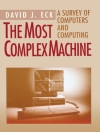A comprehensive guide to learning technologies that unlock the value in big data
Cognitive Computing provides detailed guidance toward building a new class of systems that learn from experience and derive insights to unlock the value of big data. This book helps technologists understand cognitive computing’s underlying technologies, from knowledge representation techniques and natural language processing algorithms to dynamic learning approaches based on accumulated evidence, rather than reprogramming. Detailed case examples from the financial, healthcare, and manufacturing walk readers step-by-step through the design and testing of cognitive systems, and expert perspectives from organizations such as Cleveland Clinic, Memorial Sloan-Kettering, as well as commercial vendors that are creating solutions. These organizations provide insight into the real-world implementation of cognitive computing systems. The IBM Watson cognitive computing platform is described in a detailed chapter because of its significance in helping to define this emerging market. In addition, the book includes implementations of emerging projects from Qualcomm, Hitachi, Google and Amazon.
Today’s cognitive computing solutions build on established concepts from artificial intelligence, natural language processing, ontologies, and leverage advances in big data management and analytics. They foreshadow an intelligent infrastructure that enables a new generation of customer and context-aware smart applications in all industries.
Cognitive Computing is a comprehensive guide to the subject, providing both the theoretical and practical guidance technologists need.
- Discover how cognitive computing evolved from promise to reality
- Learn the elements that make up a cognitive computing system
- Understand the groundbreaking hardware and software technologies behind cognitive computing
- Learn to evaluate your own application portfolio to find the best candidates for pilot projects
- Leverage cognitive computing capabilities to transform the organization
Cognitive systems are rightly being hailed as the new era of computing. Learn how these technologies enable emerging firms to compete with entrenched giants, and forward-thinking established firms to disrupt their industries. Professionals who currently work with big data and analytics will see how cognitive computing builds on their foundation, and creates new opportunities. Cognitive Computing provides complete guidance to this new level of human-machine interaction.
İçerik tablosu
Introduction xvii
Chapter 1 The Foundation of Cognitive Computing 1
Chapter 2 Design Principles for Cognitive Systems 21
Chapter 3 Natural Language Processing in Support of a Cognitive System 39
Chapter 4 The Relationship Between Big Data and Cognitive Computing 55
Chapter 5 Representing Knowledge in Taxonomies and Ontologies 71
Chapter 6 Applying Advanced Analytics to Cognitive Computing 87
Chapter 7 The Role of Cloud and Distributed Computing in Cognitive Computing 109
Chapter 8 The Business Implications of Cognitive Computing 125
Chapter 9 IBM’s Watson as a Cognitive System 137
Chapter 10 The Process of Building a Cognitive Application 157
Chapter 11 Building a Cognitive Healthcare Application 175
Chapter 12 Smarter Cities: Cognitive Computing in Government 197
Chapter 13 Emerging Cognitive Computing Areas 221
Chapter 14 Future Applications for Cognitive Computing 235
Glossary 251
Index 261
Yazar hakkında
Judith S. Hurwitz is President and CEO of Hurwitz & Associates, a research and consulting firm focused on emerging technology, and is a leading strategy consultant.
Marcia Kaufman is a Principal Analyst and COO of Hurwitz & Associates, with leadership in big data and advanced analytics, information management, and business strategy.
Adrian Bowles is President and CEO of STORM Insights, Inc., a market analytics firm providing research and advisory services for buyers, sellers, and investors in emerging technology markets.












